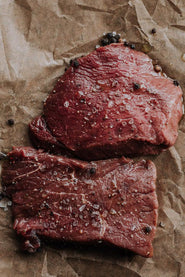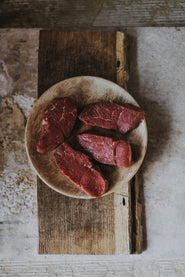A worrying statistic flashed up on my screen a few days ago, the British family farm could die out in the next 30 years. Provided British agriculture stays on the path it’s on, that may well be the direction we are heading. According to data from Defra, farms of less than 100 hectares have halved in number in the last 60 years. Small holdings have also seen a dramatic decrease too, from around 160,000 in 1950 to less than 30,000 in 2020.
Small-scale family farms are facing an uncertain future, putting the future of the sector at risk. With increasing concerns over trade deals and the new agricultural bill looming, it’s an increasingly worrying time for small producers, many of whom have shown incredible courage and resilience keeping the country fed through the outbreak of Covid-19 earlier this year.
Why are Small Scale British Farms Disappearing?
The number of US-style mega farms in the UK has increased by 30% in the past 5 years alone. This collapse in family farms has in part been driven by the rise of concentrated animal feeding operations; CAFOs. In these industrial farming units, pigs, cows and chickens are crammed by the thousand into rows of barns. Many units are semi-automated, with feeding run by computer, with periodic visits by workers.
Industrial farming dominates animal production and has an outsized influence on crop growing and land usage. The UK is now home to at least 789 mega-farms classed as CAFOs. Most highly geared industrial farms are not far off the CAFO status, and there are thousands of industrial farms taking up huge swathes of British land - once home to a tapestry of smaller farms.
The trend for the UK to follow US style agriculture is nothing new, we have been taking our lead from our cousins across the pond since the industrial revolution. However, right now the rapid expansion of farming methods are at the heart of the row over US attempts to erode Britain’s food standards and lever open access to the UK market as part of a post-Brexit trade deal. Global corporations who control the vast majority of food supply around the world are telling UK farmers, if they want to compete against American imports, they will likely have to increase the yield of their farms to force cheaper food, and lower their welfare standards - or go out of business.
The British farming industry has been under relentless pressure to make food cheaper and cheaper. Cheap food culture is still a force to be reckoned with. When looking at the amount of disposable income each household spends on food for example, the UK comes third last in the world. It has been this singular focus that has meant we have lost sight of the true cost of our agricultural industry. The cost to our environment. The cost to human health. Even the cost of our land, making access more and more difficult for new entrant farmers to start up enterprises.
Many farmers have not been able to sustain a working farm and have instead jumped off the treadmill and sold out to developers who have covered grade A farmland in housing developments. This has further driven up the price of land and made it more scarce and more difficult for the small family farm to survive.
How Can we Create a Food System that Supports Small Scale Farms?
There is extensive evidence of the important role that small-scale farms have in our agricultural landscape – creating jobs, supporting rural communities, and reducing inputs and waste on mixed farms.
Small farms such as these are often written off as inefficient or low-output. But a study carried out by the Prince’s Countryside Fund points out top-performing small family farms are just as efficient as many of the country’s much larger ones. Especially when it comes to producing higher quality food – grass-fed, hand-reared, free range, self-sustaining and regenerating.

Our Mission to Support Small Scale British Farming
“When I was a kid, all the neighbouring farms were small family farms,” explains Peter. After getting married and spending a few years farming 1800 acres on a high hill farm in Wensleydale, Peter and his wife Henri returned to the farm Peter grew up on in Kent, where his family were raising half a million chickens a year in an industrial setup. Realising this ever-more intensive style of farming wasn’t the path they wanted to take, they set about building something different.
“By 1987, all those family farms had gone,” Peter points out. “And we knew we wanted to build a business that helped to sustain the fabric of the smaller-scale farming businesses.” After looking at close to 100 farms in six months, they eventually bought a 52-acre farm in Devon and named it Pipers Farm.
“When Henri and I came here 30 years ago, there was nothing here except a muck spreader in the yard, and three tin sheds,” he points out, laughing. And from the humblest of beginnings, Peter and Henri built Pipers Farm, doing all the farming, butchery and marketing themselves with their two young children at their feet.
Today, at Pipers Farm HQ we run around 45 cattle and 100 sheep. It was never Peter and Henri’s intention to grow our home farm – instead they set their sights on building a business that supported the small-scale family farms in the surrounding area, selling direct to our customers nationwide through our website.
“Many of the farms in this valley are in the global rat race of trying to hang on as farms,” Peter points out. “We offer them an opportunity to change that. What we’re doing is trying to completely redraft the model with a completely different perspective.”
With each farm we work with, Peter and Henri look at the fundamental elements of their process. “We believe in very simple low input farming that is in harmony with nature – we look at the strengths and assets that a particular farm has to offer, and then we work out how to make the most of those resources.”

“It shouldn’t be about bigger and bigger quantities,” Peter points out. “We want people to be able to produce a sustainable amount of food, so our job is to make sure that every piece of meat arrives on our website with somebody who respects and appreciates the value of it, so the farmer gets a proper price for their efforts. We wanted it that every time a customer of ours buys a piece of meat, they know they are putting cash straight into small-scale family farms.”
Take Mark, one of our incredible farmers who specialises in rearing our slow grown, native Saddleback pigs. He and his family were dairy farmers, with a mostly indoor herd of 140 cows and a robotic milking system. After losing a quarter of their herd to TB, Mark’s family sold the rest of their cows and equipment, and both sons found work off the farm.
“One day we got a phone call about some pigs!” Mark explains. “We started off keeping some weaners, thinking we definitely wouldn’t keep any sows. And somehow we got to where we are – we’ve got just over 1000 pigs on the ground and 50 sows. It’s a mixed farming enterprise, where we’re rearing pigs for Pipers on a pastured system, using as few inputs as we can.”
Mark and his father David use electric fencing and small portable shelters to move our Saddleback pigs through different fields, rotating them with their other crops. “We grow a lot of fodder beet, so after we harvest we can put the pigs along and they eat the waste on the ground, naturally fertilising the soil and preparing it for the next harvest with little intervention from us.”
Two and a half years later, the farm is thriving and both sons are back working on the farm, full of enthusiasm for the continued potential that their Pipers Farm partnership brings.
“It’s going back to the system of mixed integrated farming,” Peter points out. “It’s about marrying together enterprises that work for each individual farm. The pigs fit in with their crop of fodder beet – it helps reduce cultivation, it improves fertility and yield. And that’s the common sense of a well-crafted mixed family farm.”

Pipers Farm is focused entirely on preserving and supporting small-scale family farms; finding a way to allow them to thrive without having to grow or become increasingly industrialised in their operation. By focusing on each individual farm and the opportunities their land or crops present, we are able to support these businesses in diversifying their operations and provide a guaranteed and simple route to market. It’s proof that when it comes to farming, big isn’t necessarily better.
Securing a Future for Small Scale Farmers
We work directly with around 30 small scale British family farms, all who rear native breed meat in harmony with nature. Excitingly we are also growing our range to include hundreds of products from many more small-scale artisan producers around the country; from small-scale artisan cheesemakers, to family run flour mills growing and milling heritage grains - and many, many more!
For us, true sustainability also includes building sustainable communities, ensuring everyone in the chain is receiving a fair price, and that the true cost of our food is being accounted for. We aim to enable small family farms to thrive by building strong relationships direct with our customers.
By shopping with Pipers Farm your money is going back into the community. It is helping us to ensure we are able to farm in a way that tackles the climate crisis, regenerating rather than depleting our soils. It is funding projects such as laying down new hedgerows, planting trees, improving water cycles and converting to renewable energy. It’s allowing traditional artisan skills to thrive in rural communities, providing important links such as low-throughput abattoirs and local feed mills. Importantly your support is securing a future for small-scale British family farms.






